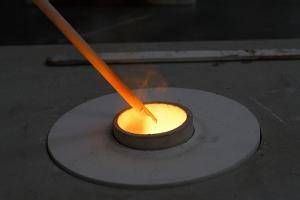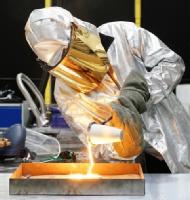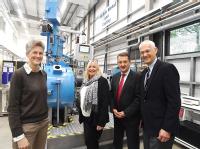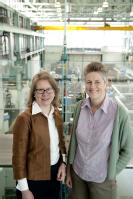WMG News - Latest news from WMG
Smarter, greener, cleaner steel: £35 million boost for research to transform UK steel industry
 A smart, green and clean steel industry will come a giant step closer thanks to a new £35 million research network, announced today, which will see steelmakers and University experts work together on a seven-year research programme to transform the UK steel sector.
A smart, green and clean steel industry will come a giant step closer thanks to a new £35 million research network, announced today, which will see steelmakers and University experts work together on a seven-year research programme to transform the UK steel sector.
The network, called SUSTAIN, is to transform the whole steel supply chain, making it cleaner, greener and smarter, and more responsive to the fast-changing needs of customers. Its work will be concentrated on two areas:
· Zero waste iron and steelmaking, with the aim of making the industry carbon-neutral by 2040: Steel is already the world’s most recycled material, but the network will investigate new ways of making the industry’s processes and products even greener, such as harvesting untapped energy sources, capturing carbon emissions and re-processing societal and industrial waste streams.
· Smart steel processing: like any 21st century industry, steelmaking involves masses of data. SUSTAIN will develop new ways of acquiring and using this data to improve the steels produced as well as in new metallurgical processes, which can deliver bespoke high tech products.
Steel is the most widely-used structural material in the world. If a product isn’t made of steel it’s made using steel. Steel is at the heart of UK manufacturing sectors such as the car industry, construction, packaging and defence. It is an indispensable component of the UK’s future national infrastructure such as transport, communications and energy, and for high-tech 21st century industries, from energy-positive buildings to wind turbines and electric vehicles.
The work of SUSTAIN is projected to:
- Double UK steel manufacturers’ gross value added (GVA) by 2030
- Boost jobs in the industry to 35,000
- Increase productivity by 15%
SUSTAIN involves more than twenty partners across the UK steel industry: companies, trade bodies, research organisations and academic experts including WMG, University of Warwick. The network is being supported by £12.5M investment from the Engineering and Physical Sciences Research Council, as one of their Future Manufacturing Research Hubs, along with significant investment from the steel companies within the UK.
The announcement is a landmark as it is the first time that UK steel producers and representatives from the manufacturing sector have lined up behind a co-ordinated programme of research. It is also the largest ever single investment in steel research by a UK research council.
The plan is that SUSTAIN will be a seed from which much wider research and innovation will grow, drawing on expertise across UK academia and beyond.
Professor Claire Davis, from WMG, University of Warwick comments: “The UK has a rich tradition of research excellence and innovation in steel metallurgy. SUSTAIN will bring together leading research groups in this area, as well as introducing new expertise in big data and supply chain innovation, to work collaboratively with the UK industry.
The network will be able to tackle the large issues facing the steel industry, particularly in becoming low energy, carbon neutral, dynamic and responsive to customer needs. It is an exciting time to be working on steel as there are opportunities to contribute to making the planet a greener place.”
Dr Cameron Pleydell-Pearce, steel expert at Swansea University and SUSTAIN’s deputy director, said: “This news is a massive vote of confidence in the steel industry. It will support the industry’s vision for a responsible, innovative and creative future. We are already on the road to clean, green and smart steelmaking, but this is another giant step forward.
Research and innovation are the bedrock of a modern steel industry. This network represents almost the whole UK steel sector, with researchers and companies working together on an unprecedented scale. Here in Swansea we’re proud to lead it.”
Gareth Stace, UK Steel Director General, said: "This new boost of innovation funding into the sector is a vital piece of the puzzle to help deliver our vision of a cutting-edge, vibrant, and sustainable steel industry in the UK.
The future success of our sector rests on our ability to remain at the forefront of product and process innovation, delivering the new steel products demanded by our customers and society. This new hub will enable us to do just that.”
The virtual factory – boost for steel innovation with £7 million to speed up new alloy development
 A new method of testing alloys - Rapid Alloy Prototyping, is 100 times faster than current methods, allowing new products to reach the market more quickly, thanks to £7 million of funding announced today for a new “virtual factory” designed by the Prosperity Partnership, including WMG at the University of Warwick.
A new method of testing alloys - Rapid Alloy Prototyping, is 100 times faster than current methods, allowing new products to reach the market more quickly, thanks to £7 million of funding announced today for a new “virtual factory” designed by the Prosperity Partnership, including WMG at the University of Warwick.
This Prosperity Partnership – led by Swansea University and involving WMG at the University of Warwick, will implement a Rapid Alloy Prototyping (RAP) process, thanks to £7 million of funding announced today from the Engineering and Physical Sciences Research Council (EPSRC)
Rapid Alloy Prototyping effectively means that much of the testing can be carried out in research labs and imaging suites - a virtual factory – rather than in an actual steel plant.
Supporting the steel industry at WMG
 Businesses of all sizes in Coventry and Warwickshire can take advantage of a state-of-the-art facility to develop the next generation of lightweight steel products.
Businesses of all sizes in Coventry and Warwickshire can take advantage of a state-of-the-art facility to develop the next generation of lightweight steel products.
WMG (Warwick Manufacturing Group) at the University of Warwick has created a cutting-edge research, design and skills infrastructure zone in its Advanced Manufacturing and Materials Centre.
Its work is focused on supporting the development of new lightweight steel products as well as building an environment to develop the next generation of experts in this specialist field and can be accessed by SMEs as well as global businesses.
The three-year project has received £1 million of funding from the Government’s Local Growth Fund through the Coventry and Warwickshire Local Enterprise Partnership (CWLEP) to buy key R&D equipment and a further £1 million from WMG which includes industry funding.
UK steel production to benefit from efficiency innovation
Steel production in the UK could be cheaper and more energy-efficient in the future, thanks to research at WMG, University of Warwick.
The ASSURE2 project, led by Professor Claire Davis, is looking to significantly cut steel production costs,  and reduce energy consumption by over 300%, through exploring the use of belt casting technology.
and reduce energy consumption by over 300%, through exploring the use of belt casting technology.
Belt casting is a significantly lower energy production route compared to traditional continuous casting techniques, as belt casting is a near net shape casting process, producing strip that needs minimal hot deformation to achieve the required product thickness.
It is also very efficient because it can minimise or eliminate any reheating processes, which reduces overall costs.
Furthermore, there are certain advanced high strength strip (AHSS) steel grades which are commercially attractive but cannot be produced using conventional casting techniques - which could be manufactured using belt casting.
Leading academics appointed to new Tata Steel Chairs at Warwick
 WMG, at the University of Warwick, have announced that Professor Claire Davis and Professor Barbara Shollock have been appointed as two new Tata Steel Chairs for research into Thermo-mechanical Processing and Advanced Characterisation and Coatings.
WMG, at the University of Warwick, have announced that Professor Claire Davis and Professor Barbara Shollock have been appointed as two new Tata Steel Chairs for research into Thermo-mechanical Processing and Advanced Characterisation and Coatings.
These appointments strengthen the rapidly developing relationship between WMG, the University and Tata Steel. They confirm the strong commitment of Tata Steel to research and manufacturing in the UK.
Building on the initial Tata Steel / Royal Academy of Engineering Chair of Professor Sridhar Seetharaman, the company and the University have been working closely to develop an exciting strategic partnership, with research, research infrastructure, education and exploitation opportunities.
